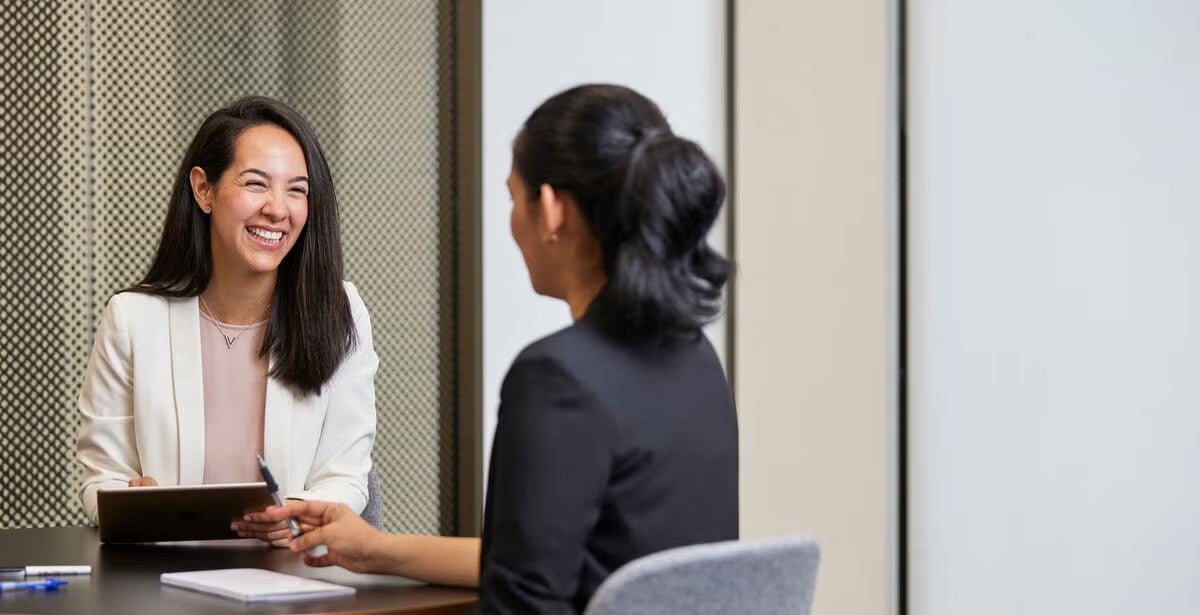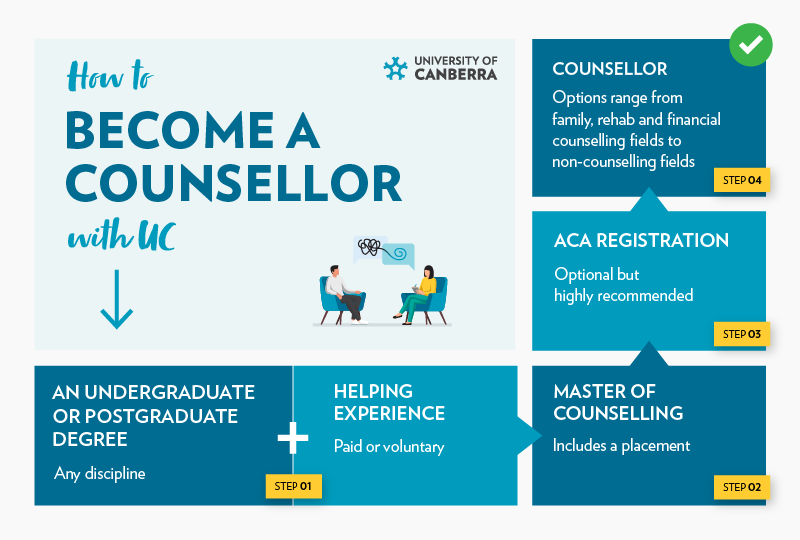How to become a counsellor in Australia

Do friends and family regularly tell you that you’re good at listening? That the advice you’ve given in the past has helped someone? Counselling is often a career that chooses us. Maybe helping someone has inspired you and now you want to do more to help others in the same way.
Recent data shows that almost half of all adults in Australia, amounting to around 7.3 million people, will face mental health challenges at some point in their lives.
This staggering figure highlights the pressing need for mental health services and support, reinforcing the critical role that professionals in the counselling field play in addressing these issues.
Sadly, however, many clinics have long waitlists or have closed their books entirely.
It’s clear that Australia needs more qualified mental health professionals. If you're ready to make a difference, explore our guide on how to become a counsellor in Australia.
What is a counsellor?
A counsellor is a trained professional who provides guidance, support and strategies to help individuals work through personal, emotional, or psychological challenges. They empower clients to better understand themselves and resolve issues impacting their quality of life and mental health.
What does a counsellor do?
Counsellors work across diverse settings, such as schools, healthcare centres, private practice, rehabilitation programs and community organisations. Their work may include:
- providing a safe space in which to talk over issues and concerns
- providing strategies and support to resolve life problems
- helping clients
- maintain healthy coping strategies
- support for clients coping with grief, anxiety, trauma and mental health issues
- working with other mental health professionals to provide holistic and personal care for their clients
The approach is collaborative and client-centred, empowering individuals to build resilience and take charge of their own lives.
Why become a counsellor?
Milli Blenkin, Head of Discipline, Counselling at the University of Canberra (UC), notes that many are drawn to counselling out of a desire to help others. Often, individuals have either received support themselves or have supported someone else, inspiring them to pursue this path.
Blenkin shares, “You get so much satisfaction from watching a person initially come to you because they have an issue they can't work through by themselves, but after working with a counsellor, they walk away ready to take on the world.”
Don’t let age stop you
If you’re considering a career in counselling but haven’t studied for a while, don’t let that hold you back.
We’ve had many mature students return to the University once they’re ready for a career change. In fact, many of our students are mature students looking to use their life experience. This could be your opportunity to follow your heart and do something that truly meets your values and gives back to your community.

Steps to become a counsellor in Australia
If you're ready to turn your passion for helping others into a meaningful career, here’s a more detailed look at the key steps to becoming a counsellor in Australia.
Step 1: Gain practical experience
Hands-on experience is a critical part of counselling education in Australia. Most accredited degrees include placement opportunities in clinical, community, or educational settings. You can also seek:
- Volunteer work – At organisations like Lifeline or Beyond Blue
- Internships – Through universities or community programs
- Helpline support roles – That build your resilience and communication skills
When enrolling in a master's course, you may also need to demonstrate helping experience – either in a paid position, such as a teacher or hairdresser or in a voluntary role, like helping out at an animal shelter or with an emergency services organisation.
If you are unsure how to find these opportunities, seek.com.au has a section dedicated to volunteer programs. These roles could also provide you with other opportunities to use your future counselling qualifications across Australia.
If you’re already interested in a particular area of counselling or in a specific industry, you could also try approaching charities or not-for-profits in that field. Ask them how you might work together in the future once you’re qualified.
These experiences enhance your confidence, expose you to real-world challenges and often count toward the supervised hours required for professional registration.
Step 2: Pursue a Master of Counselling
If you already have an undergraduate degree in any discipline or a diploma in a counselling-related field and four years of work experience, you may be eligible to apply for our Master of Counselling degree and study online.
Postgraduate qualifications can boost your employability, enable you to specialise and prepare you for roles in private practice or advanced settings.
At the University of Canberra, we offer several postgraduate courses in counselling for you to choose from:
- Master of Counselling – Ideal for career changers or counsellors aiming for advanced clinical roles.
- Graduate Diploma in Counselling and Graduate Certificate in Counselling - Entry and exit points for the Master of Counselling.
This is a professional counselling qualification and is accredited by the ACA. With core units such as Loss, Grief and Trauma in Counselling, and Creative Practices in Counselling, you’ll have an abundance of skills, ideas and theories at your fingertips.
The skills you’ll be taught will take you beyond learning theory from a lecture. They’ll allow you to provide in-depth support and advice as you approach different situations.
The course also includes two placement units that offer you the opportunity to practise your skills at an approved counselling agency.
Step 3: Achieve professional accreditation
Counsellors aren’t legally required to have a counselling qualification in Australia. However, ethical counsellors recognise that they have a duty to be accountable for their professional actions.
“If you want to go into this career to help people, you have to learn how to do that safely and ethically,” Blenkin says.
“The ACA has worked hard to ensure that professional counsellors receive the respect they deserve. This means the industry now requires at least a Graduate Diploma in Counselling and – more often than not – a master’s degree.”
Studying a course like our Master of Counselling will ensure you receive the industry recognition you deserve. It will also help to accredit you with the ACA, in line with their Professional Training Standards.

After completing our Master of Counselling online in Australia, you’ll be able to register as a fully qualified counsellor. From there, you can apply for a professional membership with the Australian Counselling Association (ACA).
This important step isn’t just about being responsible to the community you’ll be serving. It’s also about looking after yourself as a professional and engaging in self-care.
That’s because your registration will provide you with access to critical support, such as supervision and mentoring, as well as continuing professional development. It ensures you have access to everything you need to do your job to the best of your ability.
Step 4: Plan your career path
“The thing about counselling is that it's a fantastic backup professional skill to have, whatever your position and wherever you want to go in life,” Blenkin says.
This area of study can allow you to specialise in various areas within the counselling field as well, including:
- Relationships
- Youth work
- Financial support
- Rehabilitation
- School counselling
- Drug and alcohol support
Counsellors across these areas have average earnings of $90,000 to $105,000 per year.
But you don’t have to actually become a counsellor to benefit from the core counselling skills and strategies you’ll learn during a counselling degree. We’ve compiled a list of 10 career options you could explore with a counselling degree to give you a taste of the potential.
Whether you aspire to become a teacher, a manager or even a car salesperson, Blenkin says that “counselling skills mean learning to listen.”
“Only then can you give your clients what they want or need,” she adds. “We've even trained hairdressers to spot the signs of domestic violence and taught them what to do in those situations.”
Regardless of your current career path, studying a Master of Counselling online could open all sorts of doors for you. The skills you’ll develop can help you to manage and support the people around you – even if you’re not in a counselling role.
Why choose the University of Canberra to study counselling?
While our Master of Counselling degree is, of course, accredited, graduating with it provides so much more: it means you are choosing the right qualifications to become a professional, highly regarded and ethical counsellor.
We ensure that you are provided with not only the right qualifications, but also:
- practical experience to hone your skills
- supervised support from peers and clinical experts
- an understanding of cultural diversity to support individuals across Australia
- access to the latest research and technology.
Study the right way for you
The right learning style: This master’s degree is primarily online. There is face-to-face placement and students are required to attend a five-day intensive program on campus. The flexibility of the online format allows you to tailor your learning to fit your individual needs and accommodate your other commitments.
The right timing: With an intake every two months, you can start whenever you’re ready.
The right university: With a postgraduate full-time employment rate of 91 per cent, as reported by the Good Universities Guide 2025, you can trust that the skills you gain will meet future employer demands.
Frequently asked questions
How long does it take to become a counsellor?
The duration varies depending on the educational pathway:
- Diploma of Counselling: Approximately one year
- Bachelor's degree: Three years full-time
- Master's degree: Two years
Additional time may be required for supervised practice and registration processes.
Do counsellors need to register with a professional body?
While registration isn't legally mandated, it's highly recommended. Being registered with bodies like the ACA or PACFA enhances your credibility and ensures adherence to professional standards.
Find out more about studying counselling with UC
If you’re the type of person who enjoys helping people, combined with lifelong learning and development, this career path is made for you.
‘Really, a master’s degree is only the beginning. You just keep going and going – there’s always something new to learn,’ Blenkin says.
So, let’s start at the very beginning, together.
To take the first step:
- book a call with a Student Enrolment Adviser at a time that suits you
- phone 1300 471 770, or
- email us at future-student@studyonline.canberra.edu.au.
Our team is ready to help you to help others.



